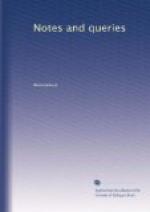Father Blackhal.—In the Brief Narration of Services done to Three noble Ladies by Gilbert Blackhal (Aberdeen, Spalding Club, 1844), the autobiographer states (p. 43.) that, while at Brussels, he provided for his necessities by saying mass “at Notre Dame de bonne successe, a chapel of great devotion, so called from a statue of Our Lady, which was brought from Aberdeen to Ostend,” &c. It may be interesting to such of your readers as are acquainted with this very amusing volume, to know that the statue is still held in honour. A friend of mine (who had never heard of Blackhal) told me, that being at Brussels on the eve of the Assumption (Aug. 14), 1847, he saw announcements that the Aberdeen image would be carried in procession on the approaching festival. He was obliged, however, to leave Brussels without witnessing the exhibition.
As to Blackhal himself, The Catholic Annual Register for the present year (p. 207.) supplies two facts which were not known to his editor—that he was at last principal of the Scots College at Paris, and that he died July 1. 1671.
J.C.R.
The Nonjurors (Vol. ii., p. 354.).—May I take the liberty of suggesting to MR. YEOWELL that his interesting paper on “The Oratories of the Nonjurors,” would have been far more valuable if he had given the authorities for his statements.
J.C.R.
Booksellers’ Catalogues.—Allow me to suggest the propriety and utility of stating the weight or cost of postage to second-hand and other books. It would be a great convenience to many country book-buyers to know the entire cost, carriage-free, of the volumes they require, but have never seen.
ESTE.
Bailie Nicol Jarvie.—Lockhart, in his Life of Scott, speaking of the first representation of Rob Roy on the Edinburgh boards, observes—
“The great and unrivalled attraction was the personification of Bailie Jarvie by Charles Mackay, who, being himself a native of Glasgow, entered into the minutest peculiarities of the character with high gusto, and gave the west country dialect in its most racy perfection.”
But in the sweetest cup of praise, there is generally one small drop of bitterness. The drop, in honest Mackay’s case, is that by calling him a “native of Glasgow,” and, therefore, “to the manner born,” he is, by implication, deprived of the credit of speaking the “foreign tongue” like a native. So after wearing his laurels for a quarter of a century with this one withered leaf in them, he has plucked it off, and by a formal affidavit sworn before an Edinburgh bailie, the Glasgow bailie has put it on record that he is really by birth “one of the same class whom King Jamie denominated a real Edinburgh Gutter-Bluid.” If there is something droll in the notion of such an affidavit, there is, assuredly, something to move our respect in the earnestness and love of truth which led the bailie to make it, and to prove him a good honest man, as we have no doubt, “his father, the deacon, was before him.”




